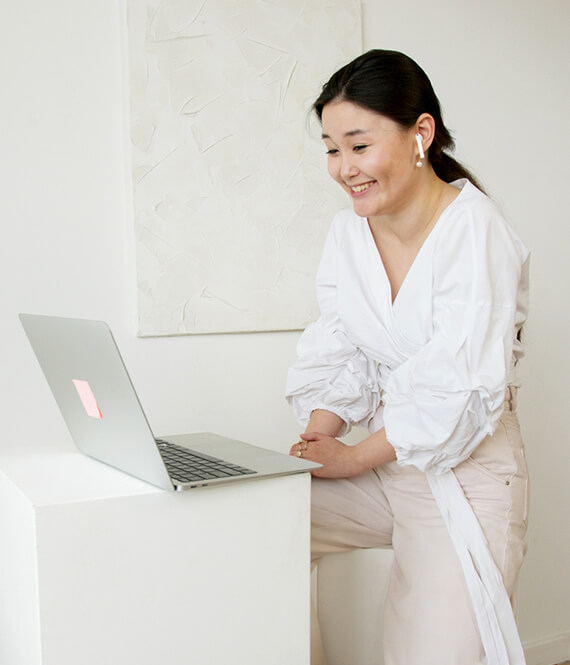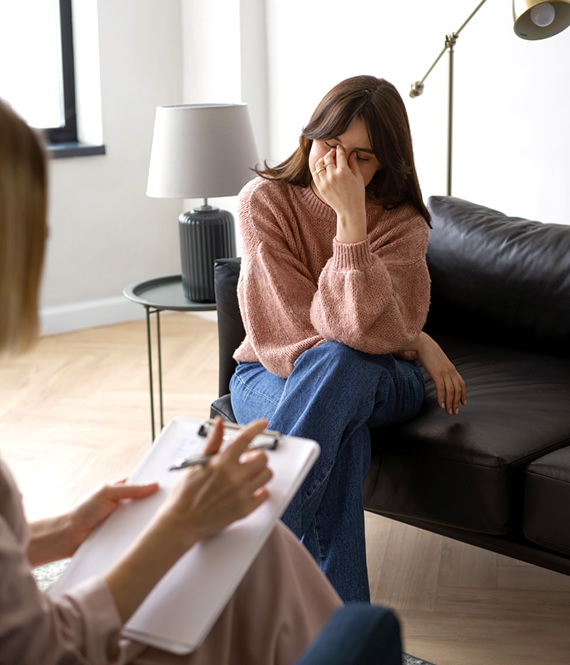
3 Ways to Identify OCD Symptoms
We recommend helpful products in our articles. Read our full disclosure here. The content on this website is not intended to be a substitute for professional advice, diagnosis, or treatment.

Obsessive-Compulsive Disorder, otherwise referred to as OCD, is a mental disorder.
OCD causes people to have certain thoughts repeatedly (obsessions) and/or causes sufferers to feel the need to perform certain routines repeatedly (compulsions).
Someone suffering from OCD will typically experience the following stages of symptoms:
- They have an intrusive thought (obsession)
- Which gives them anxiety
- Which causes them to do a behaviour to help calm the anxiety
- Bringing them temporary relief.
OCD shows up in many different ways, meaning one person with OCD could experience very different triggers and behaviours to another.
Some OCD sufferers will ritualistically turn the lights on and off multiple times to ease anxiety, while some may be paralyzed by repeating thoughts of someone close to them being physically harmed, either by themself or by someone else.
OCD Symptoms
Generally, there are four categories that OCD symptoms and behaviours fall into:
- Checking: Repeatedly checking tasks that have already been completed, such as turning the oven off or locking the door.
Checking behaviours could also include repeatedly getting medical exams or visiting the doctor as the sufferer convinces themself they have an illness.
- Contamination: You may have heard of this behaviour, as it’s the most commonly portrayed symptom of OCD.
This behaviour involves a compulsion to clean yourself and the surrounding areas.
Feeling unclean or being in a dirty environment could cause feelings of fear or anxiety to an OCD sufferer with this behaviour.
- Symmetry and Ordering: Things need to be presented and displayed in a certain way for the sufferer to ease anxiety.
When things are not in order or are not organised to the sufferers liking, this behaviour is triggered and feelings of fear and anxiety can overtake.
The hoarding behaviour also falls into this category, with a fear of something bad happening if items are discarded.
- Ruminations and Intrusive Thoughts: Obsessing over a particular thought.
These thoughts can sometimes be disturbing and violent.
The sufferer may experience violent repetitive thoughts regarding themselves or their loved ones that they are unable to stop thinking about.
How do I know if I have OCD?
There is a difference between being a clean freak and having OCD cleaning behaviours.
There’s a difference between liking things organised and feeling overwhelming anxiety when things are out of order or unsymmetrical.
Worrying about your family members is one thing, but not being able to shake violent thoughts about your loved ones is something else.
But how do you know if you actually have OCD?
Take a moment and ask yourself these three questions…
- Do I have control over this behaviour I’m exhibiting?
Can I stop if I wanted to?
When you feel triggered to act on a behaviour, do you feel anxious at the thought of not doing it?
What might happen if you don’t?
If you think that bad things will occur, or if you feel anxious with the idea of not doing the behaviour, it’s possible that you may want to explore OCD diagnosis further.
- Am I comfortable sharing this behaviour with loved ones?
Would you do this behaviour in front of friends or family?
If not, would you be comfortable sharing the behaviour with anyone?
Does it feel like a secret that you’re trying to keep to yourself?
If so, why?
Opening up about behaviours that relate to OCD can help you gain new perspectives.
If you’ve been doing something for a while, it becomes routined and normal in your life.
Sharing it with others can shine a new light on it, learning different perspectives on your situation.
You don’t have to share if you really don’t feel comfortable, but if you don’t feel comfortable, it’s worth exploring why.
If you just don’t have a sharing relationship with your support group, that’s fine!
Consider seeking out an impartial person to confide in, like a therapist.
If you just don’t want to talk about it, this could be a sign that the behaviour is taking up an unhealthy amount of headspace, which could mean you are dealing with OCD.
- Am I able to rationalise the behaviour in a way that other people would understand?
Washing hands after coming home from a commute on public transport is pretty normal!
Washing your hands again straight after just to double-check you’ve done it correctly may not be.
Leaving the house and then coming back to check the stove is off is, again, pretty standard behaviour from time to time.
But repeatedly checking it multiple times in the same outing could be considered an obsessive compulsion.
If you were to explain your behaviour to a friend who does not suffer from OCD, would they understand, relate to, or agree with the behaviour?
Or would they find it to be irrational?
If you’re unable to rationalise your behaviours in ways that mentally healthy people around you can understand, you may want to speak to a doctor about OCD.
How to get diagnosed with OCD
If you’re concerned you may have OCD and are ready to take steps to manage symptoms, it’s time to talk to your doctor.
OCD is typically diagnosed when the patient is experiencing either obsessions or compulsions or both.
In 2005, the NHS developed the NICE Guidelines for the treatment of OCD.These guidelines help doctors in the UK diagnose OCD in patients so that they can refer the patient to a therapist for treatment.
The International Classification of Diseases (ICD) is an international standard of diagnostic criteria formed by the World Health Organization.
The ICD is used to diagnose OCD internationally.
Treatment Options for OCD
There are many different treatment options for OCD, online, and offline.
Therapy treatment is most commonly recommended for OCD sufferers, with Cognitive Behavioural Therapy (CBT) being the most successful form of treatment.
A shocking 75% of OCD patients undergoing CBT experience improvements in their symptoms.
Other treatment plans include online courses, specifically designed to suit each individual’s unique experience with OCD.
While the NHS in the UK offers free healthcare, it can take a few months before commencing therapy after your doctor refers you out.
Private therapy in the UK is also an option, but note that going private can be expensive.
The same issue appears in the US, with in-person therapy often being quite pricey.
Online courses seem to be tackling these issues, offering immediate treatment plans at an affordable rate.
Impulse, for example, offers affordable, personalised online OCD Therapy treatments, using CBT, ACT (Acceptance and Commitment Therapy), ERP (Exposure and Response Prevention) and Mindfulness methods.
What do to first
If you’re concerned you are displaying symptoms of OCD and you would like to get help, make sure to speak with your doctor about your concerns.
From there, you will be able to work with your doctor to get a diagnosis and decide the best course of action for treatment.
"We love to research problems, examine studies, analyze solutions, and share with you ideas that make life healthier. You can learn about us and our editorial standards here. Have suggestions or feedback to share? Send us a message!."













Leave a Comment